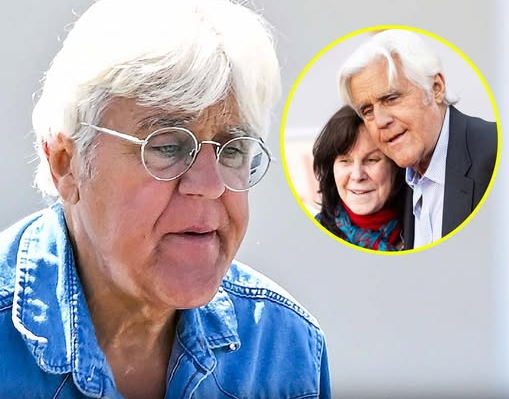Jay Leno has always been the man who could make a room laugh with just a raised eyebrow or a perfectly timed joke. But in recent years, the former Tonight Show host has faced something no humor can ease: his wife Mavis’ fight with advanced dementia. The diagnosis became public in 2024, along with the news that Leno had been granted conservatorship to manage her care, protect her estate, and make major decisions on her behalf.
Jay and Mavis had been together for decades, long before fame, money, or late-night television. They met in the 1970s at The Comedy Store in Los Angeles. Leno had just finished a set, and Mavis was in the audience. She later admitted that Jay wasn’t exactly smooth when it came to dating and that marriage hadn’t been on her radar—but meeting him changed everything.
“I always thought I’d never get married,” she told People magazine in 1987. “Then Jay came along, and it felt like the first time I was truly where I was meant to be.”
They married quietly in 1980 and built a relationship that endured every challenge fame could throw at them. Leno often joked about the secret to a lasting marriage: don’t cheat, don’t be foolish, and marry someone whose character you admire.
“Marry your conscience,” he said once. “Marry someone who’s the person you wish you could be.”
For years, they lived by that principle: grounded, loyal, steady. But everything changed as Mavis’ memory problems became impossible to ignore. Confusion, forgetfulness, and behavioral changes became frequent. Eventually, doctors diagnosed her with advanced dementia—a condition that gradually erases memories, independence, and recognition of familiar people and places.
It’s a diagnosis that can shatter families. But Jay, stubborn in the best way, refused to let it fracture theirs. He became her full-time caregiver. No institutions, no facilities—just him. Her husband. Her anchor.
In April 2024, the court granted conservatorship, which Mavis agreed to. Her lawyer told reporters she was “receiving excellent care” and truly safe in Jay’s hands. Anyone who knows him wouldn’t be surprised—loyalty isn’t something he performs for cameras; it’s who he is.
On November 9, Leno made a rare public appearance at the Harley-Davidson Love Ride in Glendale, California—a charity he’s supported for decades. Surrounded by bikers, fans, and photographers, he spoke openly about life with Mavis in a way that was raw and honest.
“I’ve been very lucky in my life,” he said. “My wife is fighting dementia and all that, but it’s not cancer. It’s not a tumor. So I enjoy taking care of her.”
No dramatics, no self-pity. Just a man accepting reality and showing up anyway.
He explained that people often approach him with sympathy, offering apologies and condolences. He understands, but he doesn’t see caregiving as a burden.
“It’s not work,” he said. “I like taking care of her. I enjoy her company. We have a good time. We have fun with it. It is what it is.”
Being her caregiver isn’t an obligation—it’s an extension of the devotion they built their marriage on. He feels fortunate, not trapped.
“It’s tricky,” he admitted. “But I’m very lucky. I’m lucky I can take care of her, lucky I can afford the care she needs, lucky we’re still together. As soon as this ride’s over, I’m going home and I’ll make her lunch.”
There’s something profound in that simplicity: a man with millions of dollars, global fame, and a garage full of rare cars, proudest of all that he’s going home to make lunch for his wife.
Mavis has always been private. While Jay was the public figure, she was the steady presence at his side—a partner, not a spotlight chaser. She dedicated years to activism and humanitarian work, especially for women’s rights. Now, the world sees her vulnerable, fragile, and living with a degenerative illness.
Dementia is relentless. It doesn’t care about celebrity or a successful marriage. It erases memories without mercy. But it cannot touch love, loyalty, or the determination of a spouse who refuses to give up.
Jay manages her appointments, medications, routines, safety, and meals—everything. Dementia impacts daily life in ways many can’t understand. Some days are okay, some are confusing, some are heartbreaking. Caregiving means staying steady even as the person you love slowly fades.
When Leno says, “I enjoy her company,” it isn’t naïve. It’s a choice. A commitment. A refusal to mourn someone who is still alive.
Caregivers know this: it’s not the illness that defines the relationship—it’s how you show up. And Leno shows up. Every day.
Long-term celebrity marriages are rare. Husbands stepping into full-time caregiving without hesitation, bitterness, or ego are even rarer. Leno’s attitude reminds us that lasting love isn’t built on romance—it’s built on showing up when life gets hard.
There’s dignity in what he’s doing. Groundedness. A quiet grief that lingers in the edges of his words. His love hasn’t dimmed—it’s sharpened.
He doesn’t see her as a burden. He sees her as his wife—the woman who believed in him before fame, who stood with him through every high and low, who made their home solid and real. And now he’s returning the favor.
Jay Leno isn’t asking for sympathy. He isn’t seeking praise. He’s simply showing what devotion looks like when life hits hardest.
In a world full of drama, this kind of quiet loyalty still matters.
